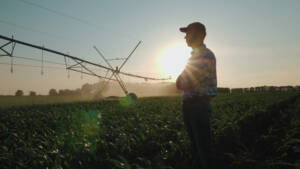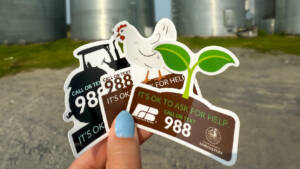Modern Farmer: Farmers Face a Mental Health Crisis. Talking to Others in the Industry Can Help
AFBF Staff

photo credit: Ohio Farm Bureau, Used with Permission
According to the National Rural Health Association, farmers are 3.5 times more likely to die by suicide than the general population. A recent CDC study of occupational suicide risk also found that male farmers, ranchers and other agricultural managers had a suicide rate more than 50 percent higher than the overall suicide rate of men in all surveyed occupations.
Farming and ranching are physically and emotionally demanding jobs with high risks of chronic stress, anxiety and depression due to a number of challenging factors—many out of their control—including extreme weather, outbreaks of pests and diseases and market volatility. Many deal with the stresses of potentially losing farms that have been in their family for generations.
With all of these pressures, there are also several barriers to getting help, including stigma and many producers feeling like they should be able to handle the situation themselves. Along with a lack of anonymity in small towns, there’s also often a lack of access to proper providers or support in rural areas. According to a survey from the American Farm Bureau Federation, 46 percent of farmers and farmworkers surveyed said it was difficult to access a therapist or counselor in their local communities. The rest of the survey also revealed barriers due to cost prohibitiveness of treatment and embarrassment.
In January, the Farm Family Wellness Alliance, a coalition of organizations including the American Farm Bureau, announced the availability of Togetherall, an anonymous, clinically moderated online peer-to-peer community with a special section for farmers and ranchers. Typically expensive, the alliance came together to make Togetherall free for farm country.
“In a peer-to-peer community, you seek that sense of belonging and that sense of being able to express yourself without judgment,” says Jessica Cabrera, staff lead for the American Farm Bureau’s Farm State of Mind campaign.
Clinicians monitor posts 24-7 and are available to talk privately if necessary. If support needs to be escalated, they will be referred to someone who specializes in agricultural support.
There are also courses for self-assessment, as well as access to services outside the platform, including consultants that handle legal, financial, childcare and many other concerns. “It’s important to keep working to break the stigma around mental health challenges and just encourage people to reach out for help,” says Cabrera, who adds that the American Farm Bureau has already seen a 22-percent shift in farmers being more comfortable talking about mental health.
Read more from Modern Farmer.
What We're Saying

Farm State of Mind Alliance: A New Chapter in Taking Care of Our Own
Nov 5, 2025
READ MORE

Farm Bureau Welcomes Next Era of Supporting Farmer Mental Wellbeing
Nov 4, 2025
READ MORE

Darkest Before Dawn – Steve Breeding’s Story
Sep 18, 2025
READ MORE

Delaware Farm Bureau and Delaware Department of Agriculture Prioritize Mental Health Awareness
Jun 20, 2025
READ MORE
Top Issues
VIEW ALL